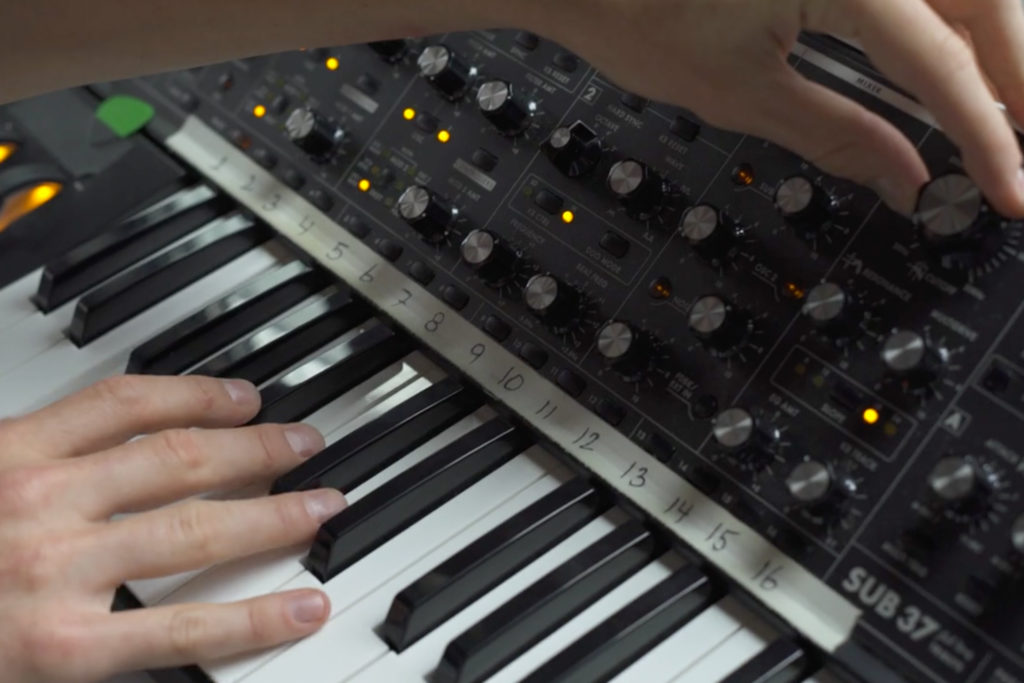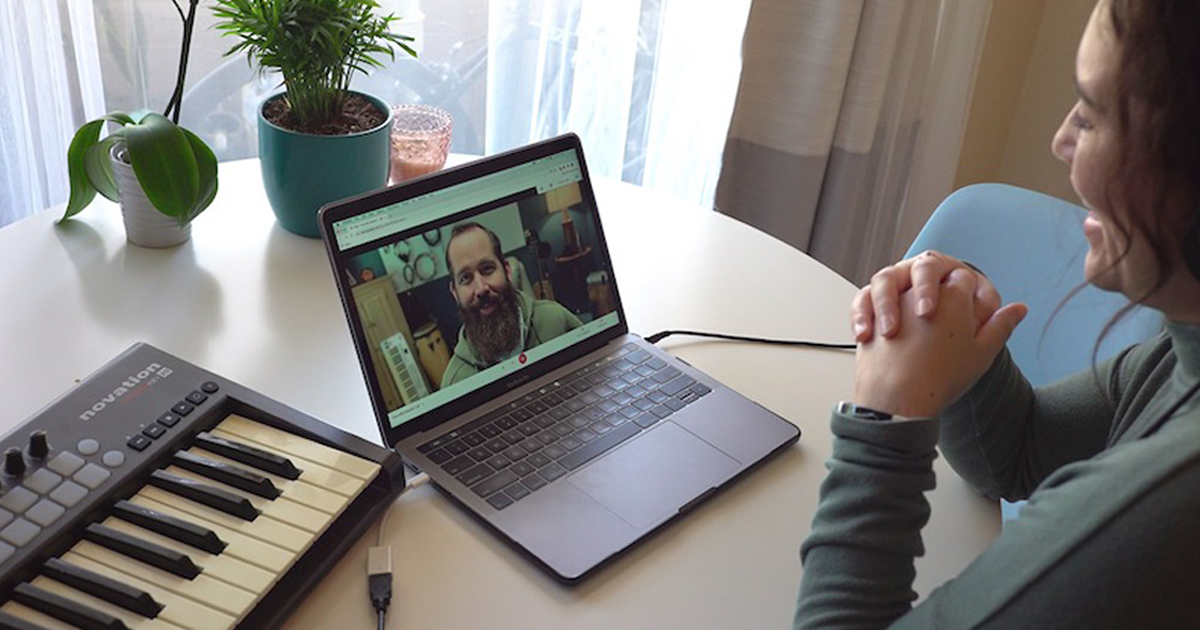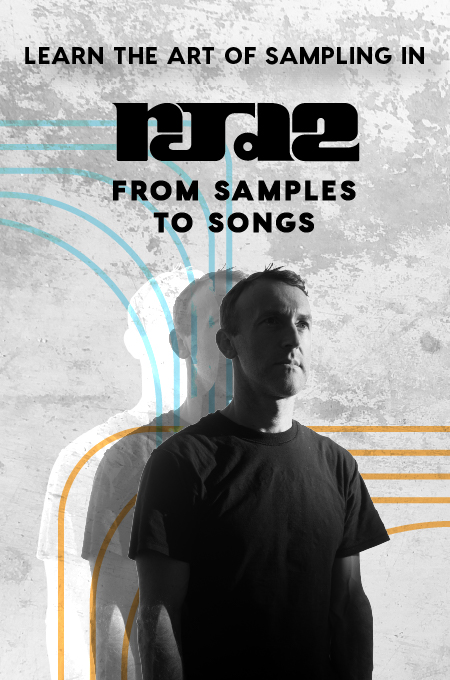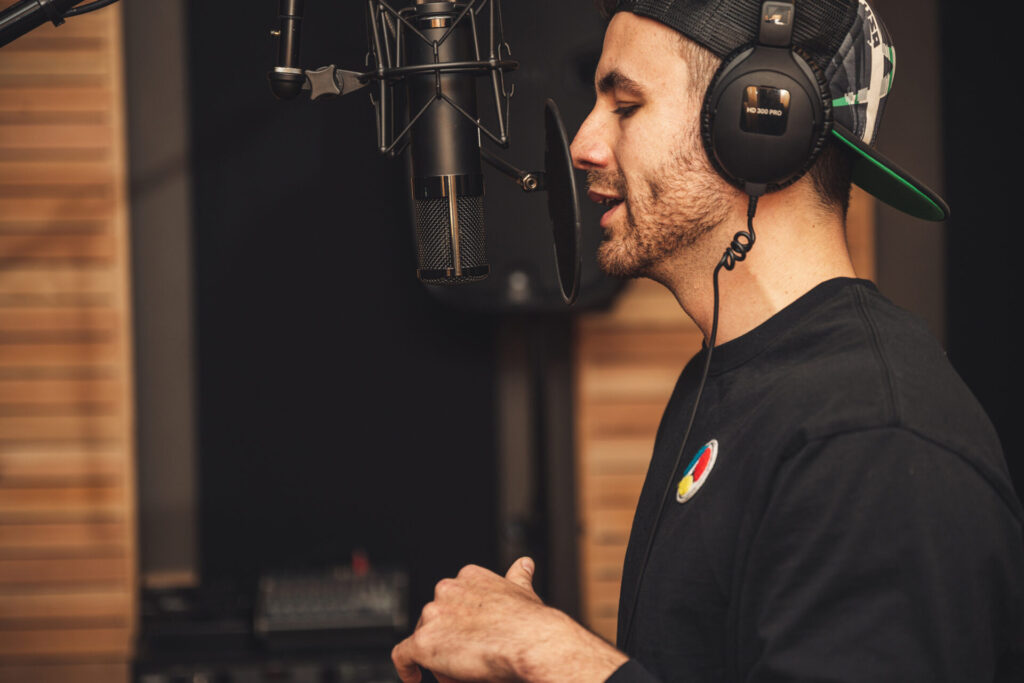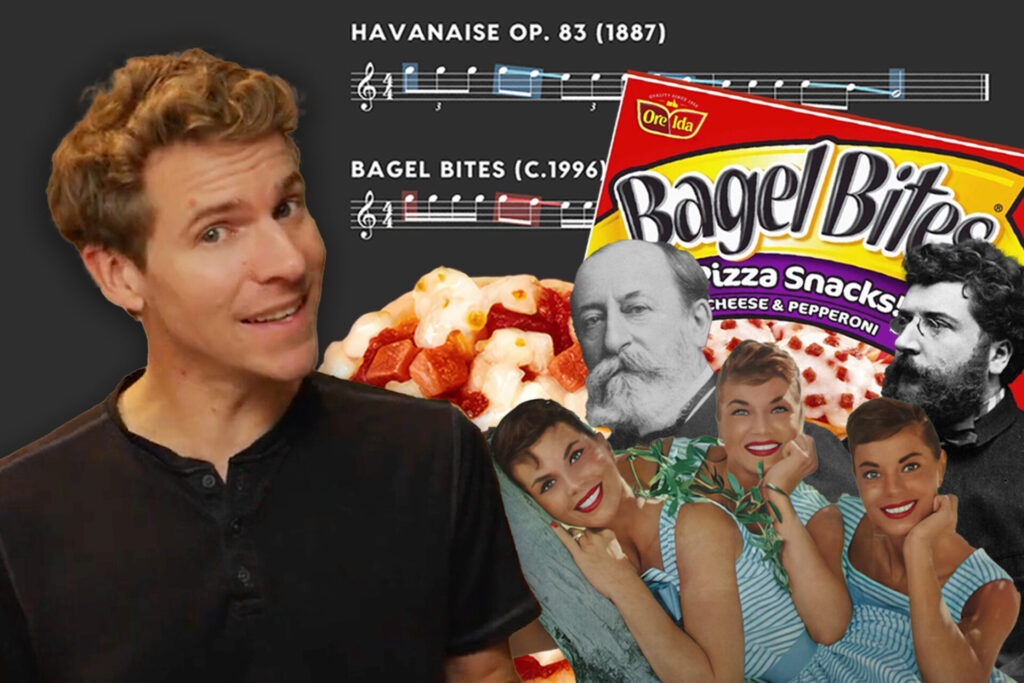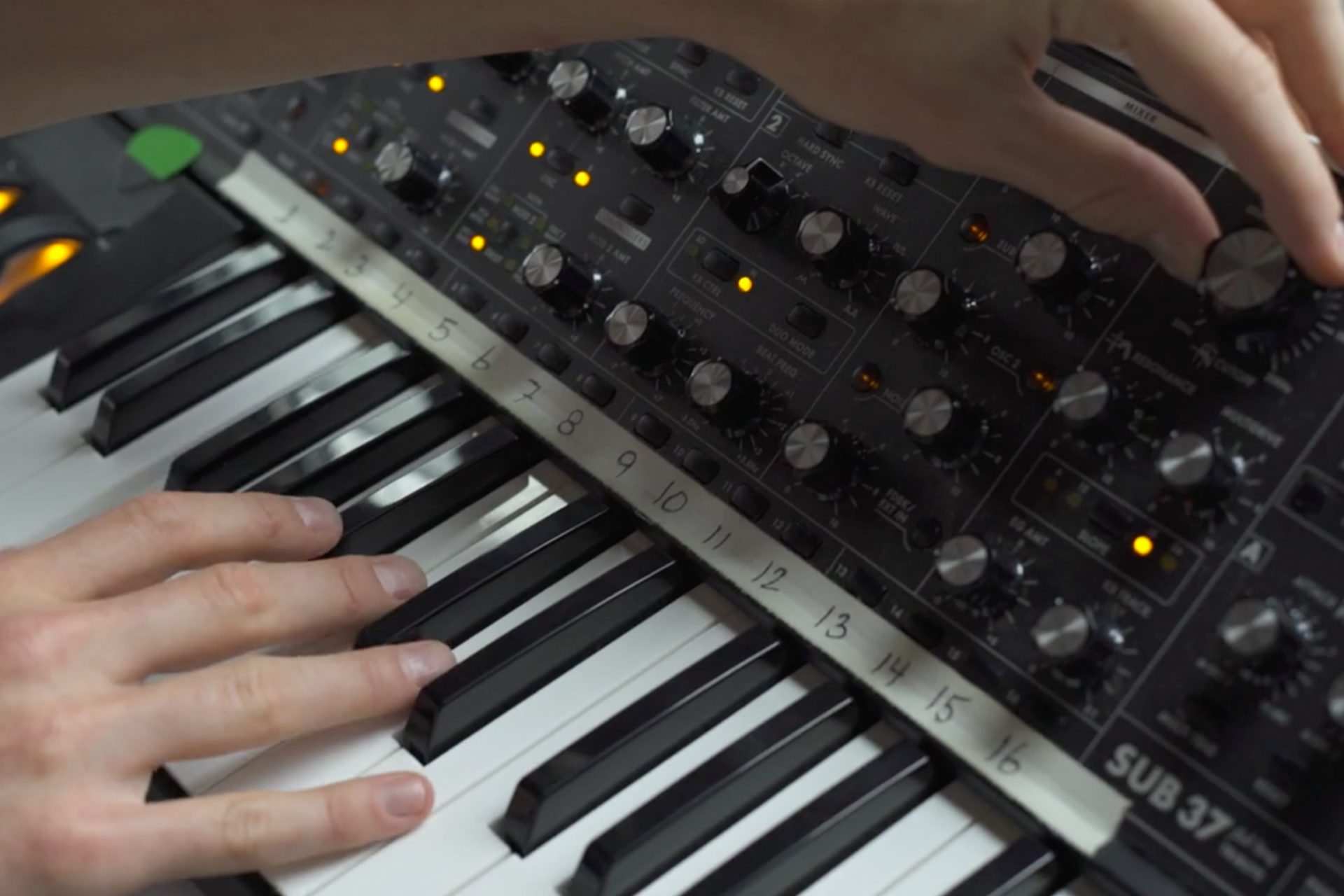
+ Turn your unfinished ideas and half-developed loops into full, compelling songs with Soundfly’s online course Songwriting for Producers. Preview a lesson for free and subscribe for unlimited access here.
By Erik Anderson
Here’s a pervasive idea that affects many creatives, particularly those just starting out:
“If my work isn’t somehow perfect, or the absolute best I can make it, it’s not worth putting out there.”
Not only is this idea untrue, it can be detrimental to your creativity. I’m here to talk to you about how I spent a year actively attempting to dissuade myself of this idea.
Hopefully I’m able to help you along the way to get out of your own way!
But First, Some Background
I have struggled with perfectionism for a long time, a habit which is not only difficult to break but also not very conducive to the creative process. When it came specifically to music, I also had a lot of ideas that I felt almost impatient to express, that I just wanted to get out of my head!
I started taking inspiration from a couple sources; the now deleted YouTube channel of Unus Annus, as well as fellow Soundfly student Daitenshi and his Friday Night Headphones (FNH) project! Both revolved around the idea of just putting content out there on a regular basis for people to see, regardless of perceived quality or anyone’s (including one’s own) expectations.
This idea appealed to me not only because I would be regularly executing on the musical ideas I wanted to express, but also because the time constraint presented two challenges: being able to meet a deadline, and being able to allow my work to exist even if it didn’t feel complete or “perfect.”
As such, I set up my own version of this challenge, with the parameters being to create and upload a new song every two weeks for the entirety of 2021. This would allow me (with my unpolished workflow and full-time job) a long enough period to work on each song, and also observe any changes in myself and/or my music over the course of the project.
With that, the Biweekly Musical Nonsense (BMN) project was born! Listen to some of the tracks I created during this period below.
Three Significant Learnings
1) Set clear expectations, and don’t be afraid to adjust them.
When I initially started this project, I went in thinking that I would be able to start from scratch and put out the song idea that was in my head every two weeks without problems. This expectation, more often than not, went unmet due to life in general and/or my perfectionist habits. So, even though I sometimes spent hours a week working on these pieces, I became discouraged, anxious, even depressed that my work that I, as a person, wasn’t good enough.
It’s incredibly easy to beat yourself up for not meeting your own self-expectations. However, just as important as setting goals or expectations is managing them.
What I tried to remember is that we are rarely in control of every variable in our lives. Groceries need to be bought, relationships with those we care about need to be maintained, day jobs need to be worked, and so on. These all take time and energy away from projects, sometimes more than you initially expect, and that’s perfectly okay!
I also tried to be mindful of my limitations. A key part of my project was the self-imposed deadline, and I had only been songwriting for a few months when I started it. This meant that I was working on improving my workflow and working under the pressure of a deadline at the same time.
“Just as important as setting goals or expectations is managing them.”
With that in mind, I adjusted my goal to putting out a song idea each week. I also began setting 25-minute timers (or “pomodoros,” which we talk about here) to work short breaks into my routine so I wouldn’t force myself to work for too long. This way, regardless of length or any other metric I could think of to decide whether or not the piece was “good” or “finished,” I would be satisfied when I uploaded it.
So if you’re feeling overwhelmed by your own project, don’t be afraid to scale back your expectations or adjust your goals so that you can meet them! Many creatives will tell you, fixating on minor details and editing as you go when you’ve only just begun not only eats time, it can make you feel as if your idea is lackluster when it really isn’t.
+ Learn production, composition, songwriting, theory, arranging, mixing, and more — whenever you want and wherever you are. Subscribe for unlimited access!
2) Originality is kind of overrated.
I had some weird “rules” that I put myself under regarding originality when I started this project — using an existing song as a point of reference or as cover material was fine, but it had to sound much different. Using found samples and making synth patches from scratch was okay, but using synth presets wasn’t.
Basically, I didn’t like the idea of taking shortcuts with my work just to sound better, because it didn’t seem as authentic, like I was cheating myself of a learning experience, or plagiarizing the work of others.
While originality can be a loaded term — especially when it comes to plagiarism, which is NOT okay — let’s take originality in this context to mean something that makes your music sound unlike anything that’s been made before. While it’s definitely good to try and make your music stand out, this is a mostly unhelpful definition.
You may be asking, why? Well, imagine this hypothetical scenario — imagine how many songs would be left in the world if you took away all the ones that are not original according to you. That is, they sound like another song that already exists, they were inspired by another song or artist, they’re made with synths or instruments used in other songs, etc.
Without getting too nitty-gritty, in such a world, songs made with samples — basically all early hip-hop, and a lot of pop and electronic music made in the last few decades — would cease to exist. Songs that use an instrument, chord progression, or melody, used in a song that already exists is a no-no. Any song inspired by or paying homage to the work of another creative (covers, remixes, or even works like Rush’s 2112 and Metallica’s Ride the Lightning) would not be around.
Basically, music as we know it today is built on the back of our predecessors. From the timbre of the instruments to the chord progressions and melodies that define our favourite pieces, it’s very difficult to use something in your music that has not already been used. Therefore, it’s easy to sound at least a little bit similar to something someone has already made.
And that’s okay! There are so many little opportunities to make things your own — from the exact kind of instruments and sounds you use, to how you record them, to how you tweak your plugin settings — that there’s a nearly infinite variety of possible sounds out there.
Coming to know that, I became okay with falling back on synth presets, and tweaking them to make them my own. I listened more actively to reference tracks, and tried to remember that sounding similar to them wasn’t automatically a bad thing. As I did that, my process gradually sped up, I started to learn more about the plugins I used, and overall, I became more confident in my music.
So actively listen to some music you like. Download some samples or presets and play with them, tweak them, distort them. Try to mimic a beat, chord progression, or melody from a popular song. And most importantly, remember that music, like other art forms, is not created in a vacuum — it’s born of the work of dozens or even hundreds of musicians who preceded you. With time and practice, your own sound will emerge!
+ Read more on Flypaper: “On Nick Cave’s 9 Primary Bedevilments of Creativity.”
3) Take care of your mental health.
I previously mentioned feeling discouraged, anxious, and depressed during this project.
Biweekly Musical Nonsense sketches were written during whatever free time I could spare for them, since I have a full-time job and other responsibilities I need to tend to. And because I made no money off of these, it remained a passion project. Albeit, one I poured a lot of effort and time into.
Because I was putting so much of myself into this project — and not necessarily being mindful of my limitations or perfectionism, even later on in its run — I experienced burnout several times. I would space out and lose interest while sitting in front of my computer, even if I felt like I had a great idea rolling. I would feel incredibly anxious and my self-confidence would tank.
I even considered abandoning the project altogether multiple times throughout it, for different reasons, but usually tying in with the general thought: “I can’t keep doing this.”
With mental health, as with a skill like writing or producing music, it’s easy for others and even oneself to believe that improvement should resemble a straight path upwards; that it’s consistent, it’s encouraging, it’s easy. It’s nice to imagine that mental health steadily improves with time.
The truth is, improvement in mental health or a skill is very rarely (if ever) linear. For most people, myself included, one’s mental health over time will resemble something more like a mountain range — soaring peaks and deep valleys separated by slopes of varying grades, from sudden drops to gentle rolls. And while we can build better habits to manage and mitigate the extremes, there still may be lows where you feel too down to work on your music, or highs where you feel too overstimulated and anxious to focus.
“For most people, myself included, one’s mental health over time will resemble something more like a mountain range — soaring peaks and deep valleys separated by slopes of varying grades, from sudden drops to gentle rolls.”
For creatives, this is compounded by the fact that you have your own preconceptions or expectations of your own work. And oftentimes, these can cause us to be unfairly critical of our work; and by extension, ourselves.
Drawing from a personal example, I sometimes expected my next song to be better than the last, based on how I felt about my last work and how much work I was putting into the next one. But oftentimes, I was disappointed since parts of it didn’t match up with what I imagined it to be, leading me to question or even disparage my own ability as a musician. Which in turn made me perceive almost everything I had made as worse than I had thought before, even doubting those who supported it!
What Helped Me?
While I cannot speak for others and what may help improve their mental wellness. I would like to share what helped me during this project — my forms of self-compassion and self-care. A quick disclaimer that I’m not a mental health professional; however, I do endorse professional counseling and/or therapy if it is an option for you, based on my own positive experiences.
First, practice being aware of your thoughts and emotions, and how they may be affecting one another. This is a core tenet of practices like mindfulness and cognitive behavioural therapy, as it can help identify, acknowledge, and counter distorted thought patterns before they spiral out of control.
Second, set aside some time for both exercise and leisure. As clichéd and difficult as it may seem to find time for either, both are super important to maintaining mental health – physical and mental health have been shown to be tightly tied to one another (hence the importance of exercise), and leisure time allows you to do something just for fun, to allow it to bring you joy without the burden of anyone’s expectations.
Third, find a community that values you and that you value back. I’m incredibly fortunate to have the support of so many fantastic musicians of all skill levels in the Soundfly community, whom I can turn to for feedback or advice when it comes to music.
However, a community doesn’t even need to consist of people directly affiliated with the skill you want to practice — it can include friends, family, or anyone that values you for who you are rather than the sum of your achievements. I am grateful beyond words to all my friends that I turned to for help last year, whether that was just by hanging out with them or asking for their thoughts.
If nothing else, remember that at the end of the day, you are still a human being — multifaceted, imperfect, and worthy of your own self-respect.
To Conclude…
As of writing this, I’ve opened my DAW maybe a handful of times to lay out some new ideas. I sometimes struggle with impostor syndrome now that I’m done with BMN, with finding a balance between music and the other parts of my life, and even the lessons I’ve learned from this project.
But take it from me — no matter how wild or underdeveloped a song idea feels, not only is it worth writing down, it’s worth putting out there. Whether for critical feedback, self-affirmation, or just the sheer fun of it, it’s worth it. And I hope what I’ve learned helps encourage you to do so.
Continue learning with hundreds of lessons on songwriting, composing, home recording, electronic production, beat making, and much more. Explore Soundfly’s exciting courses like Modern Pop Vocal Production, Unlocking the Emotional Power of Chords, and Kimbra: Vocal Creativity, Arranging, and Production.
